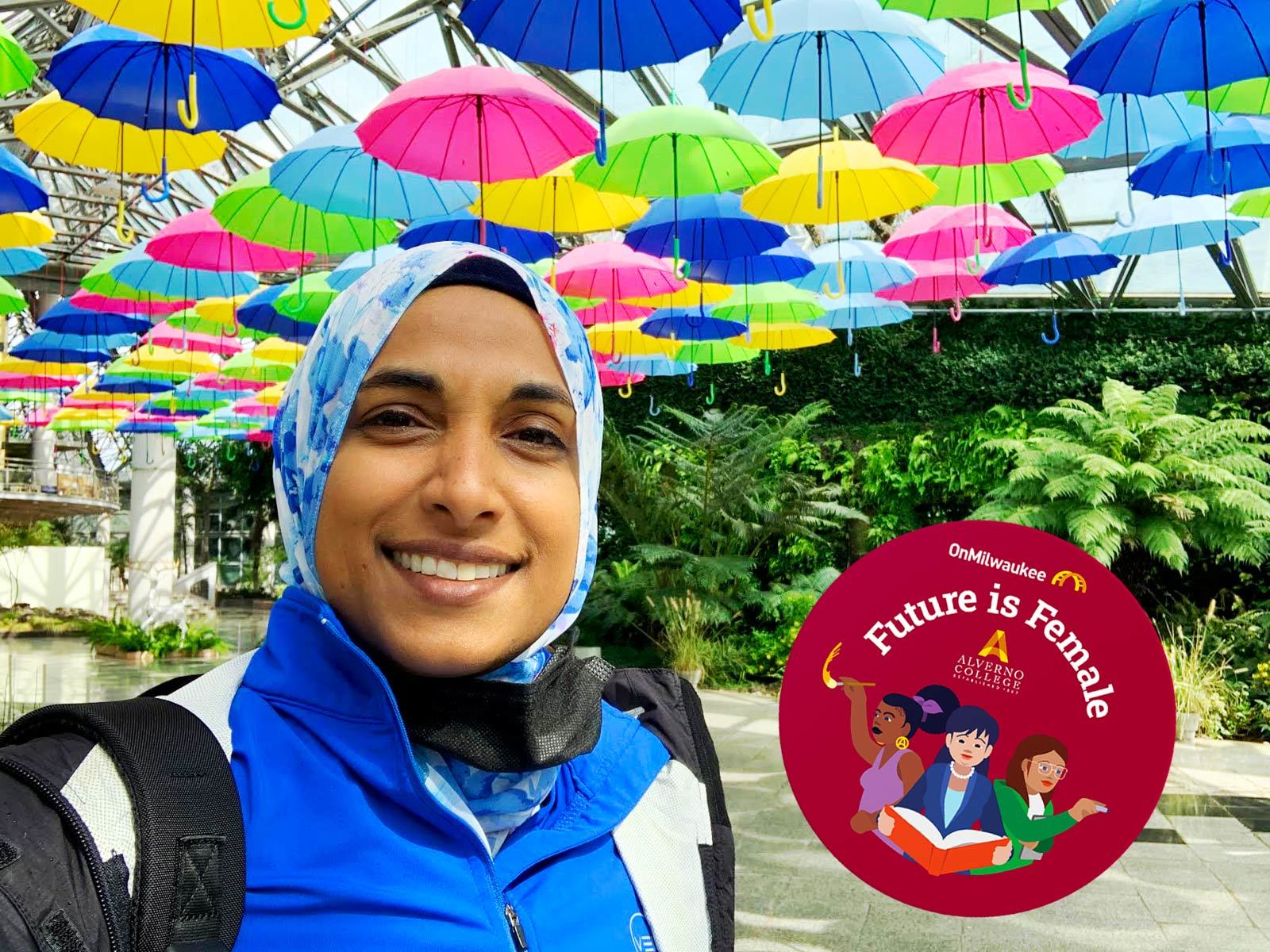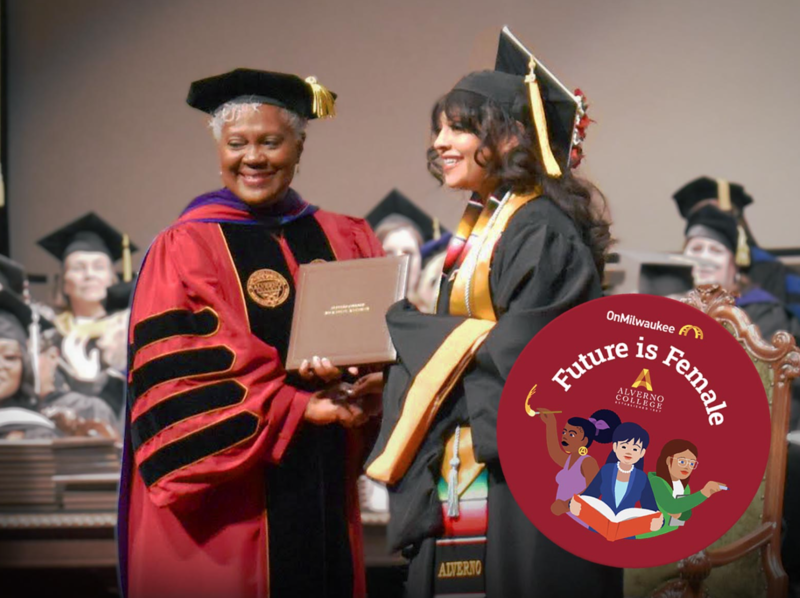OnMilwaukee's The Future Is Female series is brought to you by Alverno College and features some of the most interesting, innovative and intelligent women in the city.
Alverno College, for over 135 years, has strived to educate and empower women to realize their leadership, strength of voice and potential to lead in the working world. Alverno’s support of “The Future is Female” continues to showcase and exemplify these efforts by supporting the stories of grit, resilience and strength of character of present, past and future leading women in the Milwaukee community! #AlvernoStrong
Dr. Aishah Aslam is a certified cardiologist with the Ascension Medical Group who was born and raised in Flint, Mich. She later graduated from the University of Michigan-Flint and Michigan State University College of Osteopathic Medicine.
Aslam moved to Milwaukee three years ago to accept her current position. She finds great satisfaction in her medical work in Milwaukee, but is equally as fueled by her medical mission work that led her to Greece where she helped Syrian and Afghan refugees and to Bangladesh to work with the Rohingya refugees.
Aslam was a driving force behind the Muslim Mental Health Conference that took place in Milwaukee through the Milwaukee Muslim Women's Coalition (MMWC).
OnMilwaukee recently had the opportunity to chat with Aslam and ask her eight questions based on the "8 Abilities" that all students achieve with an Alverno degree: Communication, Analysis, Problem Solving, Valuing in Decision-Making, Social Interaction, Developing a Global Perspective, Aesthetic Engagement and Effective Citizenship.
OnMilwaukee: What does active listening mean to you? Do you consider yourself a good listener, and if so, how has this helped you in your personal and professional relationships?
Dr. Aishah Aslam: Active listening means taking the time to hear what someone is saying to you without getting preoccupied with formulating an immediate response. It means trying to understand what someone else is saying as it pertains to them and trying to understand the significance their stories hold in their lives.
It’s a struggle to be an active listener both with family and with patients, but it is so important to all relationships to really get to the core of how to help each other out. I’m still working on getting better at it, but I do make a conscious effort to try to be an active listener, as it helps me also to hone in on the deeper meanings and needs of the speaker that even they may not be aware of at the time. I find it especially relevant with my patients who sometimes have physical ailments that are actually being triggered by underlying stress and anxiety.
What was the last subject you were curious about and then pursued to learn more? How did you pursue it?
It may sound boring, but I feel like I’ve always had a bit of a knack for strategic planning even though my earlier studies were never geared toward developing that more. Through Milwaukee Muslim Women's Coalition (MMWC) I’m trying to tap into that a bit more and I’m currently taking a course on managing nonprofits by Peter Drucker to get my feet wet in the subject.
If you can’t figure something out yourself, what source or person do you turn to first? How long do you wait before you ask for help? As a woman, do you think you wait longer to reach out?
I have a tendency to try and figure things out on my own first. If I can’t figure it out, then I may look to friends or family who I think have experience with that particular topic. I think to some degree it may be associated with my being female: you assume that your male counterparts have a leg up in the arena and you feel as though asking them would put you at a disadvantage or you assume they would look down upon you for not knowing. In a world where there’s still so much gender inequity, you feel as though seeking help would give leadership a reason to consider you inferior. That may not be the case at all, but I think we grow up in our current society feeling that way.
That being said, I do think that my generation and younger have also shifted toward seeking answers ourselves and waiting to ask others because of the rise of easily accessible information; we’ve come to value interpersonal conversations and discussions less which is unfortunate. A perfect example – and I’m trying to get better about this – is when I travel with my family. My father is the type of person where, even if he knows the answer, will ask questions to random strangers that we encounter, just to make conversation. And through that we gain so much more from our experiences with other humans, we learn their stories, we get to learn more about different cultures, the person we talk to actually ends up feeling valued and we all leave the conversation more enriched and fulfilled.
My tendency on trips is to look everything up online, and this can lead to a very lonely trip with minimal social interaction. Now I’m making more of an effort to ask questions and seek out conversations with others.
What are your personal values? Who and/or what inspired them and how do these values affect your decision-making process?
To treat others with mercy and love, and to find ways of promoting that kind of conscientious interaction for the betterment of society and for our collective survival. Because without that collective humanity, the world becomes a much more difficult place for everyone to live in.
Who inspired it? The prophet Muhammad. One of his special talents was being able to make everyone around him feel valued to the point where everyone thought that they were loved the most by him.
And of course, my mom. My mom taught my siblings and I to approach others with mercy and love, and she did so not just verbally, but by practicing what she preaches. From the handyman to the in-laws to the old aunties and uncles in the community, she always taught us how to go the extra mile to make those around her feel valued.
Technology and on-line communication/meetings/social has definitely changed over the years. Do these things help or hinder your growth – or both?
It helps to stay in touch, to share ideas, to stay connected – to some degree. But as we’ve learned it can also constrain us, remove critical thinking. Technology and the virtual world has also kept us confined to our own social and political bubbles where we no longer have the ability to develop our thinking through critical thinking. And I learned all too well the dangers of this when I went to work with the Rohingya refugees. The genocide they dealt with was fueled in large part by social media and fake news.
For my own personal growth, I find that interacting with technology and communicating virtually can still be useful, so long as I am wary of their drawbacks and I do my best to try and compensate for those by getting myself out to social events where I interact with people in person, getting involved in the community and reading books more to try and maintain a certain level of critical thinking and personal development.
Where is the farthest you’ve traveled and what is a thing or two you learned from the experience? And what surprised you?
Oh, I can talk to you all day about my travels. I love traveling internationally. The farthest I’ve traveled is South Korea. I fell in love with the place and visited twice so far. I loved my experiences there – I got to meet some amazing people who I’ve kept in touch with. I think we often take for granted how diverse certain areas of the US are and even the Hollywood representation of America is. Especially living in some diverse areas of the Midwest, I’m used to seeing people from different backgrounds intermingling. So I think it’s always a little adjustment when you go to such a country as South Korea and they’re so homogenous.
I traveled around the whole country and while I never had any negative interpersonal interactions, I sometimes did feel that I stuck out like a sore thumb, being an obvious foreigner with my headscarf and my brown skin. But nothing breaks the ice like attempting to speak to them in their own language. Once I was out hiking and an older Korean man I passed said "Marhaba" assuming I was Arab because of my headscarf. We got to talking and it turned out he had lived in Saudi working for many years and actually knew Arabic. Then another Korean man offered me his seat on a bus and he spoke fluent English. Speaking with him I learned that he’s also fluent in French as he goes back and forth between France and Korea, and he was currently working on helping grow the Halal meat industry in Korea even though he himself wasn’t Muslim, which I thought was pretty cool.
My favorite encounter was on my most recent trip to Jeju island just off the southern coast of South Korea. I met a retired Korean professor who had actually converted to Islam and had studied in the Middle East for over a decade and was fluent in Arabic and English and had a degree in Shariah law. He had to move back to Korea during the Gulf war and he said, "And that’s when I realized I couldn’t do anything with a Shariah degree in Korea, so I had to get my PhD in tourism." He was a funny guy, we could’ve chatted for hours.
What are your favorite art forms? How do you challenge yourself to actively engage in the arts?
I love cinematography/videography. My dream when I was younger was to be one of those National Geographic videographers or people who made films like "Blue Planet." Nowadays I am trying to slowly build my knowledge of the art by learning through You Tube. I feel like years of studying medicine left little room in my brain for my creative side, but I’m hoping in the future I’ll be able to put more time and effort into putting these new skills into practice.
How do you/your work move Milwaukee forward?
I moved here just under four years ago initially for work, but I’ve always had a keen interest in community development and projects that help bring people together. That’s why I ended up joining the Milwaukee Muslim Women’s Coalition and through this organization, I’ve been able to be a part of amazing work that seeks to pull different faith groups, cultures, politics together in a way that’s unique to Milwaukee and it’s diverse population.
One of the first things that was mentioned to me about Milwaukee during my job interviews was that it was diverse, but that it was one of the most segregated cities in the country. I feel proud of the work I’ve been involved with at the MMWC and as a cardiologist in one of Milwaukee’s safety net hospitals, because I feel that it’s slowly helping to change that narrative, by taking down barriers, bridging gaps and getting people to talk to and learn more about one another.
Molly Snyder started writing and publishing her work at the age 10, when her community newspaper printed her poem, "The Unicorn.” Since then, she's expanded beyond the subject of mythical creatures and written in many different mediums but, nearest and dearest to her heart, thousands of articles for OnMilwaukee.
Molly is a regular contributor to FOX6 News and numerous radio stations as well as the co-host of "Dandelions: A Podcast For Women.” She's received five Milwaukee Press Club Awards, served as the Pfister Narrator and is the Wisconsin State Fair’s Celebrity Cream Puff Eating Champion of 2019.







